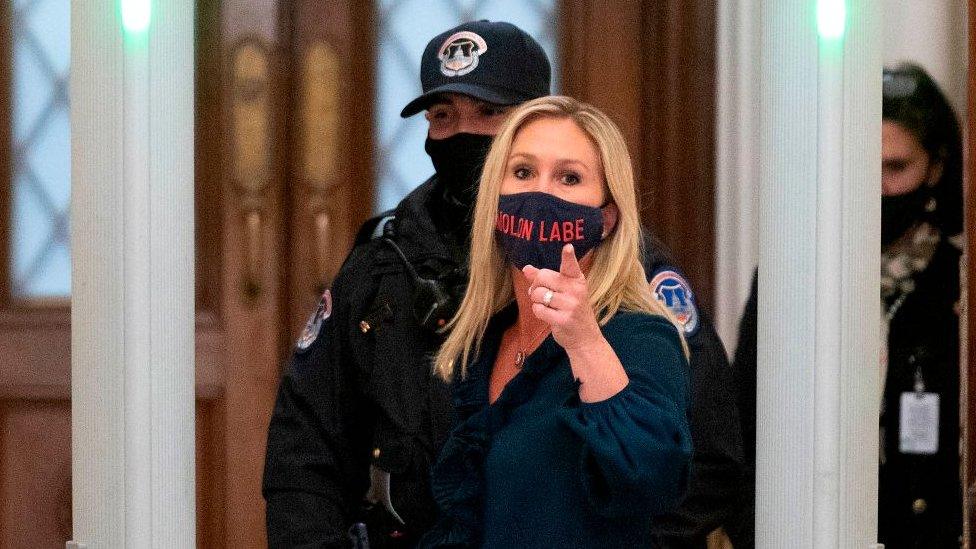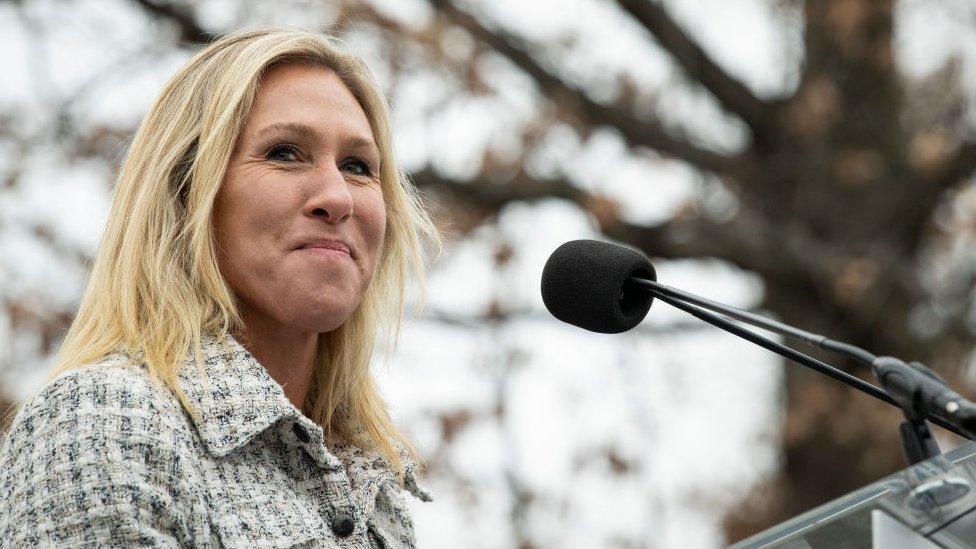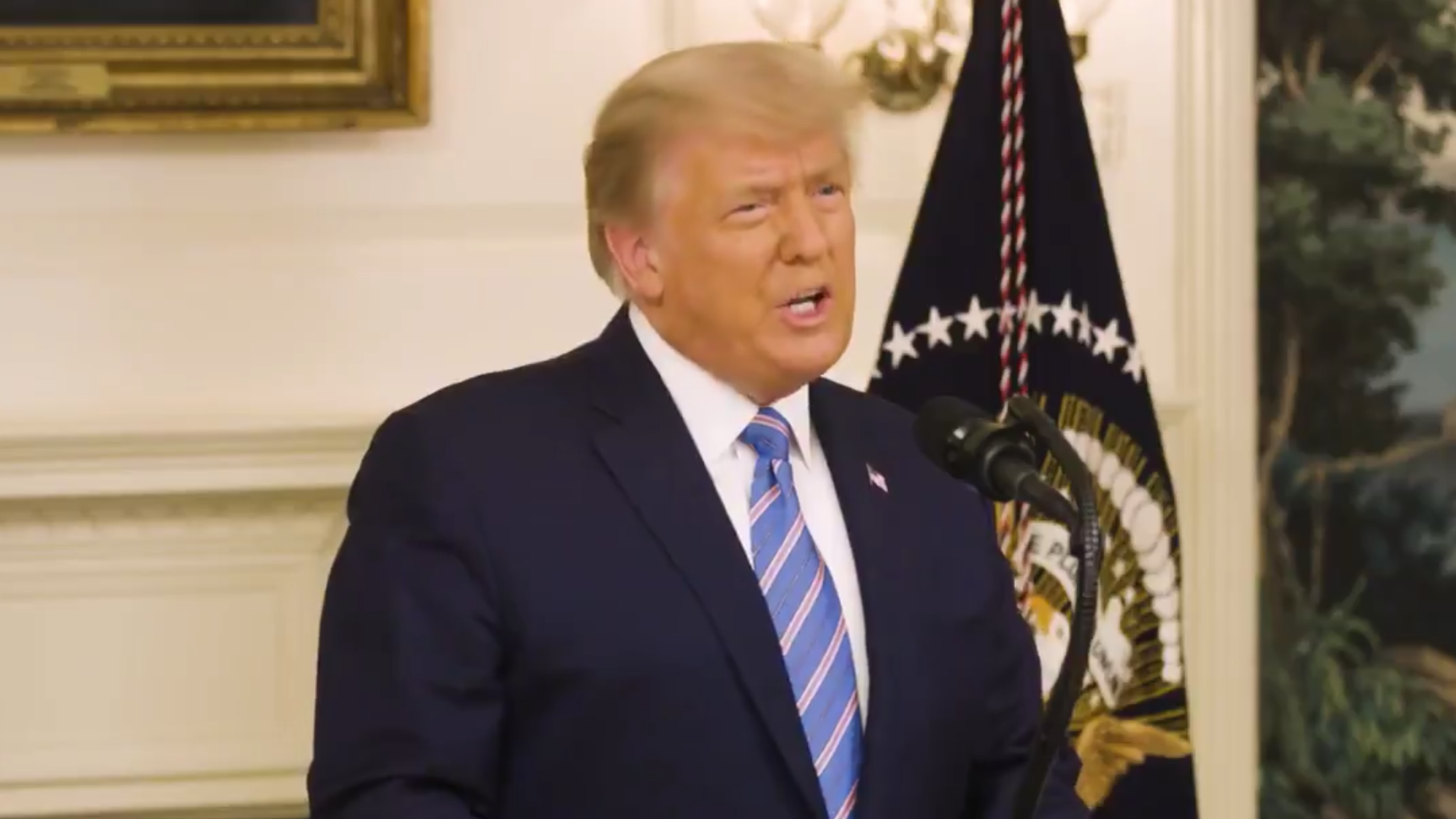Marjorie Taylor Greene: Why she embodies Republicans' post-Trump dilemma
- Published

After just a few weeks in Congress, Marjorie Taylor Greene is doing a really good job getting attention from the backbenches.
The firebrand Republican is not doing as well at endearing herself to her party's leadership.
In the past week, liberal groups and media outlets have scrutinised Greene's past social media activities and unearthed a wealth of inflammatory material, the most recent involving a Parkland shooting victim.
This has forced Republicans, once again, to distance themselves from the businesswoman turned conservative activist turned elected politician.
But it's what she represents that makes the situation tricky - full-throated, grassroots Trumpism which is confrontational, conspiracy-laden and sometimes tinged with racial overtones.
What did Greene say to a school shooting survivor?
In a recently unearthed video, external recorded a few weeks after the February 2018 mass shooting at Marjory Stoneman Douglas High School in Parkland, Florida, Greene followed gun-control activist David Hogg, a survivor of the attack, as he visited senators at the US Capitol, peppering him with questions about why he wanted to confiscate her firearms.
She called him a coward for refusing to reply to her and said he was being paid by George Soros and other deep-pocketed liberals.
Congresswoman confronts Parkland survivor
"As we fight for peace we also face massive amounts of death threats and armed intimidation simply for not wanting our friends to die anymore," Hogg wrote in a tweet responding to the video. "This is not the country we should be, and it's not the country we have to be.
What are her other controversies?
Over the past few years, Greene's social media accounts "liked" comments calling for the murder of Democratic politicians.
She has suggested that Hillary Clinton was involved in a child mutilation and paedophilia ring, and claimed that several high-profile school shootings were staged.
Black people "are held slaves to the Democratic Party", she once noted, and white males are the most repressed group in the US.
What's the reaction been?
On Wednesday,Democratic California Congressman Jimmy Gomez announced, external he was drafting a resolution to expel Greene from the House of Representatives.
"Her very presence in office represents a direct threat against the elected officials and staff who serve our government, and it is with their safety in mind, as well as the security of institutions and public servants across our country, that I call on my House colleagues to support my resolution," he said.

Democratic Speaker of the House Nancy Pelosi joined the fray on Thursday, attacking the Republican leadership's choice of Greene's committee assignments.
"Assigning her to the education committee when she has mocked the killing of little children at Sandy Hook Elementary School, when she has mocked the killing of teenagers at the Marjory Stoneman Douglas High School," Pelosi said. "What could they be thinking? Or is thinking too generous a word for what they might be doing?"
How has Greene defended her comments?
Like the ex-president she wholeheartedly supports, Greene appears to have concluded that the best way to defend herself is to go on the attack.
In response, Greene released a statement saying the reports of her social media activities in 2018 and 2019 were attempts by "fake news" to "cancel" and silence her conservative voice.
"Over the years, I've had teams of people manage my pages," she tweeted., external "Many posts have been liked. Many posts have been shared. Some did not represent my views."
"They want to take me out because I represent you. And they absolutely hate it," she wrote. "Prepare for the smears. Prepare for the attacks."

Read more from Anthony

What's she said about QAnon and Trump?
That the representative from north-west Georgia has made inflammatory, conspiracy-laden comments isn't exactly news.
Her incendiary views on race and sympathies for the fringe group Q-Anon were public knowledge when she first ran for Congress last year, prompting some Republicans - including House minority whip Steve Scalise, who called her comments "disgusting"- to support other candidates for the Republican nomination.
Once she won the party's primary, however, conservative criticism subsided, and she routed her Democratic opponent in the November general election.

In the days that followed, as Donald Trump challenged his election loss in Georgia and other swing states, Greene became one of the then-president's most vocal supporters.
She travelled with him on Air Force One to a Georgia rally in early January, where Trump paused during his hour-long speech railing against the "rigged" election, the media, the Supreme Court and Republican officials who were not sufficiently supportive of him, to call her up on stage.
"I love her," Trump said, as he gave her the microphone. "Don't mess with her. Don't mess with her."
Two days later, an angry mob of Trump supporters - many of them waving QAnon signs and echoing conspiracy theories drawn from the same sources as Greene - stormed the US Capitol in an attempt to block certification of the 2020 presidential election results, injuring more than 100 police officers and killing one.
The 6 January insurrection, and subsequent information about the background of the participants, has cast Greene's previous comments in a new, more dangerous light - and spurred the recent attempts to dig deeper into her past.
What are Republican leaders saying now?
The recent revelations about Greene are causing renewed unease among the Republican leadership in the House, which is still grappling with the fallout from having 10 members break ranks and vote for Donald Trump's impeachment two weeks ago.
When the political website Axios asked, external a spokesman for House Republican leader Kevin McCarthy if he was aware of the controversy swirling around Greene, he responded that her comments were "deeply disturbing" and that the chamber's top Republican "plans to have a conversation" with her about it.
Whether the political equivalent of a trip to the school headmaster's office will be enough to tamp down Greene's penchant for provocation remains to be seen.
Could Greene be expelled by Congress?
It seems unlikely that Gomez's efforts to force Greene from Congress will be successful, however. Reaching the two-thirds majority necessary to do so would require significant support from Republicans in the narrowly divided House of Representatives. And even some Democrats may be uneasy ejecting a colleague for remarks made before she was elected, lest it lower the bar for such moves in the future, when they may be in the minority.
There are several other options available in the House, however. The chamber could vote by simple majority to censure Greene - a symbolic move, but one that would allow members to go on record condemning her words. McCarthy could also choose to strip Greene of her committee assignments, limiting her ability to shape policy in the earliest stages of the legislative process.
That was a tactic McCarthy employed in January 2019 to punish Iowa Congressman Steve King, who had a long history of making controversial statements. The final straw for Republicans, who had just lost control of the House, was when he asked the New York Times why terms like "white supremacist" and "white nationalist" had become offensive.
What does it tell us about the future of Trumpism?
President Trump may have gone silent for now - but Greene has eagerly stepped into the void.
She clashed with local reporters who tried to ask her questions at a recent town hall event in her congressional district. And last week she filed articles of impeachment against President Joe Biden the day after his inauguration - while Republicans were complaining that Democrats were diminishing the impeachment process with their pursuit of Donald Trump.
The Greene controversy can be seen as a microcosm of the larger debate among Republicans over the direction the party should take after Trump's departure from the White House.
As Republicans appear to back away from the kind of sweeping renunciation of Trump that would result from an impeachment conviction in the Senate, they are demonstrating that politicians like Greene - in touch with the passions of the party's activists and base supporters - continue to be an integral part of their electoral coalition.
Greene may get a talking to from McCarthy, but chances are she - like Trump himself - will not be easily excised.
Related topics
- Published7 January 2021

- Published8 January 2021

- Published7 January 2021

